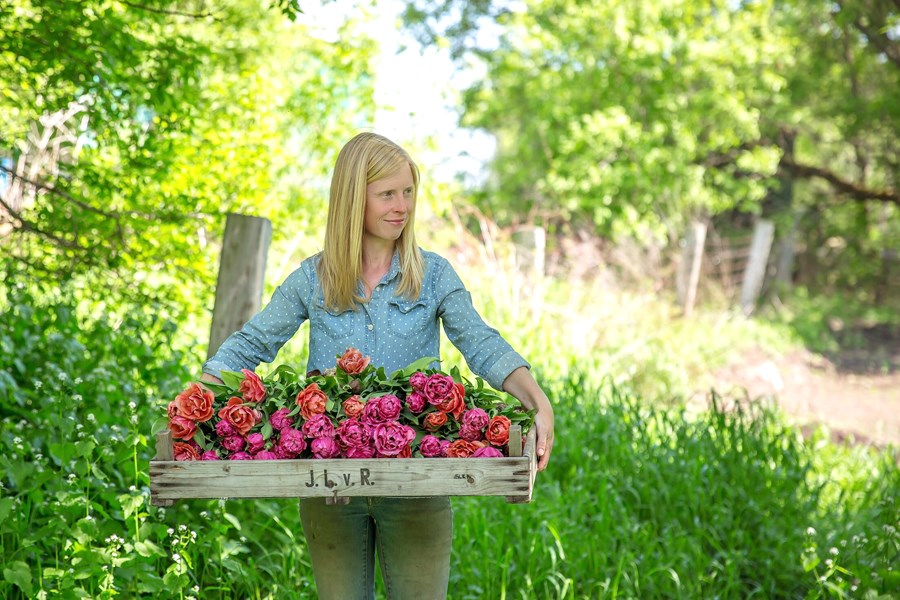The flower business has been borrowing trends from the food industry: fresh, local, sustainably grown and often heirloom. What does this look like?
If you happen to be an Instagram user (and a gardener) you may have come across one of the growing number of “farmer-florists”: small-scale growers who serve local markets with unique flower varieties from their very photogenic floral farms. Often, they market themselves through social media.
While today there is a vibrant community of farmer-florists close to home, the current trend traces its roots to the Skagit Valley in Washington State. In 2008, Erin and Chris Benzakein established Floret Farm which started as a small business of cut flowers which quickly spawned a full-fledged research and education farm and a popular book, Floret Farm’s Cut Flower Garden. This title is considered equal parts resource and inspiration for many of the growers who call themselves farmer-florists today.
In Canada, Melanie Harrington established Dahlia May Flower Farms on her family farm in Trenton, Ontario after reading Benzakein’s book and deciding to take a workshop on Floret Farm in Washington. With over 60,000 Instagram followers (@dahliamayflowerfarm), Harrington has no problem marketing her sustainably grown, unique and often heirloom varieties from her roadside stand and to local florists.
The beauty of flowers, of course, is that they sell themselves. “A lot of trends from the local-food movement are definitely spilling over”, Melanie told Ben when he dropped by the farm where she now produces row upon row of colourful flowers for cutting. “A handful of commercial greenhouses in the Niagara area have also been switched over to marijuana production, which puts a crunch on supply of greenhouse space. There’s a lot of trends coming together, but I’m just happy to focus on what I enjoy doing – being creative and growing beautiful flowers.”
Located in Thornhill Ontario, Antonio Valente is a perfect example of how the farmer-florist trend is taking hold even in more urban environments. Valente was a substitute teacher with a passion for flowers when he started selling cut flowers from the beds he kept in his parent’s backyard.
Also marketing himself through Instagram, where he posts rich photography from his garden as well as how-to videos at @antonionvalenteflowers, he recently took over his parent’s half-acre property and still can’t grow enough to meet demand. “I’m competing with larger growers who are producing acres of flowers, so I grow varieties that a florist wouldn’t typically find from a wholesaler, heirlooms such as dahlias Gerrie Hoek and Pam Howdenand foxglove Sutton’s apricot. This allows me to differentiate myself and compete with the big guys.”
Florist Rebecca De Oliveira, of Blush & Bloom Flower Studio, is buying more of her fresh cut flowers from these farmer-florists as the trend continues. De Oliveira’s enthusiasm was apparent in speaking to us, “I buy a lot from the growing number of small batch growers, and it’s amazing. Their product is far superior to anything we see imported. It’s fantastic!”
“Fresh”, “local”, “sustainable” and “unique” are common buzzwords that describe both the trend towards farmer’s markets and farmer-florists.
Local growers are bound by the same seasonality as the rest of us gardeners – in about a month Canadian gardeners will be digging up dahlia tubers. Sweet peas can be sown in pots during autumn and overwintered in a greenhouse, and “hardy annuals” such as larkspur and love-in-a-mist can be sown this fall.
Many local-grown flowers are available now at local farmers markets.
The year-round value of seasonal growers is in the relationships that form between the producers and consumers in a world that has long been dominated by commodified supply chains and major auction houses. “You met my friend Melanie at Dahlia May- she’s the coolest!” exclaimed De Oliveira when we called to talk about this story.
Friendships that blossom in business over something as precious as locally grown flowers – isn’t that what this business should be about?
Mark Cullen is an expert gardener, author, broadcaster, tree advocate and Member of the Order of Canada. His son Ben is a fourth-generation urban gardener and graduate of University of Guelph and Dalhousie University in Halifax. Follow them at markcullen.com, @markcullengardening, on Facebook and bi-weekly on Global TV’s National Morning Show.
Ěý



